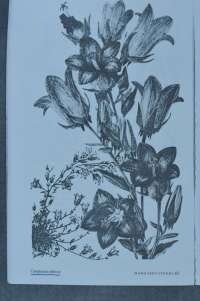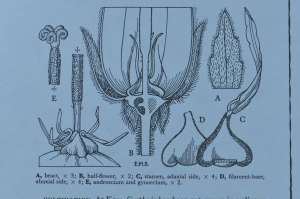ephesia
Campanula Ephesia
ephesia :Orig 022179-0169-83 Locn 8, rec: SEED: 1ab: 1, dis: Turkey, ayr: 83 1) ephesia :Orig 015733-0011-77 Locn 1A AM, geo: 28200 rec: SEED: 1ab: 1, dis: W. Turkey, ayr: 77 2)
Nomenclatuur
Boiss., Fl.Orient. 3: 898(1875).
Synonym: * Campanula tomentosa var. ephesia DC., l.c. * Campanula tomentosa Lam., Encycl. 1:584 (1783); A. DC., Monogr. Camp. 218 (1830). * Campanula mycalea Barb. et Maj. in Barb., Lyd. Lyc. Car. 80(1890).3)Boissier
Fl.Orient. 3:898 (1875); N.E. Brown in Bot. Mag. 143: t8715 (1917); Crook, Campanulas, 218 (1951); L.H. Bailey, The Garden of Bellflowers, 35 (1953); J.Roy. Hort.Soc. 81; 81 (1956), ibid. 82: 134, fig. 43 (1957). Syntypes: Ad maenia dirupta Ephesi in Lydia, Tournefort, Aucher, Boissier: ad ruinas urbis Priene, Balnsa.4).Nach unseren Untersuchungen sind Campanula tomentosa Lam. und Campanula ephesia Boiss., wie schon Heldreich (1890) und Halacsy (1895) vermutet haben, ein und dieselbe Art. Wir nehmen daher fur diese Sippe den alteren Namen Campanula tomentosa Lam. (1783) wieder auf. Boissier verstand unter Campanula tomentosa ebenso wie Ventenat (1800) etwas ganz anderes, namlich eine Art, die in Griechenland vorkommt und die A. de Candolle (1830) wegen des alteren Namens von Lamarck (1783) in Campanula celsii umbenannte. Innerhalb des Variationsbereiches dieser ausgezeichneten und morphologisch wie auch geographisch isolierten Art stellen das von A. de Candolle (l.c.) als var. Campanula tomemtosa ssp. ephesia zitierte Exemplar von Tournefort sowie die als Campanula mycalea Barb. et Maj. (l.c.) beschriebenen Pflanzen nur unbedeutende Abweichungen dar, die besonders die Grosse und den Grad der Blattzerteilung betreffen. Campanula tomentosa ist endemisch in Kleinasien, und zwar in dem beschrankten Gebiet zwischen den alten Stadten Ephesos und Priene. Sie ist leicht kenntlich an ihren ausserordentlich grossen, leierformigen und dicht graufilzigen Grundblattern sowie an den ca. aufrechten Stengeln und den Grossen Bluten.5)
Habitus
Short-lived perennial herb, monocarpic, white tomentose throughout, subrosulate and simple or sparingly caespitose in the sterile phase. With its very large corolla, Campanula ephesia is unlikely to be confused with other of the Campanula rupestris group, except Campanula formanekiana Degen & Dorfler (Bot. Mag. T.9436) from N. Macedonia, which was at one time believed to be a rediscovery of Campanula ephesia 6).
Leaves
Woolly leaves, the juvenile rosettes of basal leaves retain their best appearance when protected from rain and not over-watered. Radical leaves narrowly lyrate, 10-30cm. long, terminal lobe ovate or ovate-elliptic 2-6cm. long, 2-5cm. broad, bluntly-toothed lateral lobes several, smaller, obtuse, decurrent. Flowering stem to about 60cm., branched to form a lax leafly panicle, the cauline leaves narrowly oblong or lanceolate, acute, up to 5cm. long, dentate, the main racemose branches of the inflorescence ascending or decumbent, each bearing a terminal flower and few to numerous lateral sub-secund 1(-3)-flowered cymes.
Die Blatter Campanula's sind meist spiralig angeordnet, quirlige Stellung kommt bei Canarina, Campanumaea, Wahlenbergia etc. vor. Sie sind entweder ganzrandig oder nur mit schwachen Einschnitten versehen; sehr selten sind die fiederteilig, wie bei Campanula Ephesia Boiss. u.a.7)Flowers
Very large corolla, flowering in cultivation after about 3-4 years. Bracts ovate-lanceolate, about 1-1.5cm. long, dentate. Calyx 5-lobed, c. 2.5-3cm. in overall length, the appendages triangular, c. 5-7mm. long, somewhat exceeding the ovary, lobes long-acuminate, c. 2cm. long. Corolla broadly tubular campanulate, 3.5-5cm. long, acute, white tomentose outside, glabrous within. Stamens filaments broadly dilated, c. 6-7mm. long and 6-7mm. broad, minutely papillate-ciliate; anthers c. 10-12mm. long. Ovary broadly obconic, c. 5mm., 5-locular; style included, 2.5-3cm. long, densely pale yellowish, papillose except the glabrous basal one-third; stigmas 5, linear, spreading-revolute, c. 6mm. long, greenish 8).
Fruit
Seed available, in small quantity. Information needed.- Species actually grown or used for breeding 9)
Origin
West Turkey, in the provinces of Izmir and Aydin-Priene and Ephesus, on Mount Pion, above the great theatre and the ruined walls.
Cultivation
Original introduction in English gardens by Sir John Barran Bt. from Priene in 1913, reintroduced in 1950 by Dr.P.H. Davis. Exhibited by W.E.Th. Ingwersen Ltd. and the Royal Horticultural Society in 1956 and gained an Award of Merit as a hardy flowering plant for the alpine house. Growing at Kew since 1970, pot-grown in ordinary well-drained compost and kept in a cool greenhouse or frame 10).
Foto 1. Page 32. Campanula ephesia Margaret Stones del Foto 2. Page 34. Drawing of the parent plant, collected as a wild seedling in 1970, made in June 1974. ([D. R. Hunt01])


